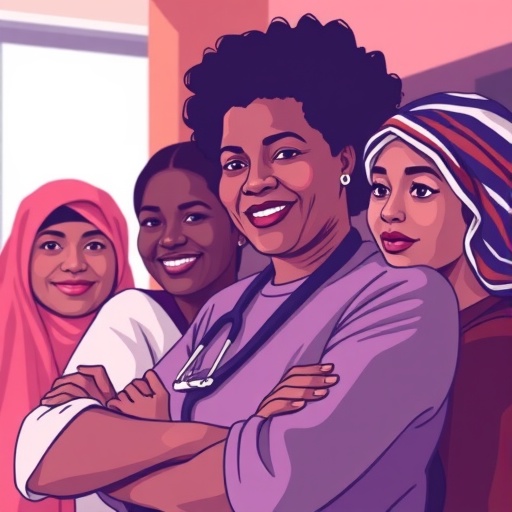In the pursuit of narrowing health disparities, a groundbreaking community-based intervention has emerged, targeting the promotion of healthier lifestyles among women with low socioeconomic status (SES). This innovative initiative, grounded in the Behaviour Change Wheel (BCW) framework, showcases a promising approach to empowering vulnerable populations to embrace sustainable lifestyle changes. Recent research from Alageel, Alsukait, Alharbi, and colleagues has rigorously examined the feasibility of this intervention, illuminating its potential to impact public health policy and practice on a global scale.
The Behaviour Change Wheel is a comprehensive model that integrates multiple aspects of behavior modification, enabling the design of interventions that address not only individual motivation but also environmental and social factors influencing behavior. By leveraging this framework within a community setting, the study strategically addresses the complex web of determinants that often render women with lower SES disproportionately vulnerable to health issues like obesity, cardiovascular diseases, and diabetes.
At the core of the study is a participatory methodology that actively involves community members, particularly women, in both the identification of barriers to healthy living and the co-creation of tailored intervention strategies. This inclusive approach ensures the relevance and cultural appropriateness of the program components, fostering higher engagement and adherence rates compared to traditional top-down health promotion efforts. Through facilitated workshops and ongoing support, participants acquire knowledge, skills, and social support necessary for meaningful behavior change.
The intervention’s focus extends beyond merely encouraging healthier dietary habits and increased physical activity; it also strategically integrates psychosocial dimensions such as enhancing self-efficacy and addressing socio-cultural norms that often impede health-positive behaviors. This holistic perspective recognizes that behavioral change is multifaceted and must be supported by a nurturing social environment to achieve sustained impact. The use of behavior change techniques (BCTs) within this framework, such as goal setting, action planning, and social support, is systematically employed to optimize outcomes.
Evaluation of the feasibility study reveals that the BCW-guided intervention is not only acceptable to the targeted women but also operationally viable within community contexts marked by resource constraints. Participants demonstrated notable improvements in health awareness, motivation, and preliminary behavior shifts—factors critical to the long-term success of such programs. Moreover, the community-based delivery model facilitates the formation of supportive networks that can perpetuate healthy habits beyond the formal intervention period.
The study further underscores the importance of tailoring public health interventions to the socioeconomic realities of the target population. Women with low SES often face compounded barriers including financial limitations, limited access to health-promoting resources, and competing responsibilities such as caregiving that challenge lifestyle modification efforts. By focusing on these barriers explicitly, the intervention navigates complex social determinants head-on, ensuring pragmatic strategies are employed to mitigate impediments and enable feasible change pathways.
Importantly, the research also addresses the methodological challenge of measuring behavior change in low-resource settings by incorporating both quantitative and qualitative assessment tools. This dual approach captures not only statistical shifts in health indicators but also nuanced shifts in participant attitudes, beliefs, and social dynamics. Such comprehensive evaluation enriches the understanding of how and why behavior change occurs within these communities, informing future scalability and adaptation of the intervention framework.
The feasibility study’s findings hold significant implications for global health equity efforts, particularly in regions where socioeconomic disparities continue to thwart equitable access to health-promoting resources and information. By demonstrating a replicable, community-anchored intervention that leverages behavior change theory, the research provides a scalable model that can be adapted and translated into diverse cultural milieus worldwide.
Beyond the immediate target demographic, this approach advocates for a paradigm shift in public health interventions—from one-size-fits-all campaigns to contextually nuanced, behaviorally grounded, and community-engaged strategies. It challenges health policymakers and practitioners to prioritize empowerment and co-production in health promotion, ensuring that interventions are not only delivered to communities but created with them.
The research team emphasizes that the integration of behavior change theories such as the BCW can significantly enhance the efficacy of public health interventions by embedding systematic identification of behavioral determinants and mapping intervention functions accordingly. This precision facilitates not only tailored interventions but also optimizes resource allocation and potential impact, which is especially critical in under-resourced settings.
A notable component of the intervention is the role of social support networks, which act as both motivators and reinforcers of change. The study highlights how strengthening interpersonal relationships within communities can catalyze positive ripple effects, enabling sustained behavior change far beyond individual participants. This insight aligns with broader literature suggesting that social capital is a critical asset in combating health inequities.
While the intervention shows promise, the research recognizes the need for longitudinal studies to evaluate long-term effectiveness and impact on health outcomes. Sustained funding, community buy-in, and integration within existing health systems emerge as pivotal factors underpinning successful scale-up. The team advocates for investment in infrastructure that supports ongoing community engagement and capacity building as essential components of enduring health equity.
In conclusion, this feasibility study represents a significant advance in the application of behavior change theory to community-based health promotion among marginalized women. Its rigorous methodology, inclusive design, and focus on socioeconomically relevant barriers position it as a valuable blueprint for future interventions aiming to reduce health disparities. The public health community stands to benefit immensely from adopting and further refining this approach, striving toward a more equitable and healthier future for all.
Subject of Research:
Community-based behavioral intervention to promote healthier lifestyles among women with low socioeconomic status using the Behaviour Change Wheel framework.
Article Title:
Stronger Together: a community-based intervention using Behaviour Change Wheel to promote healthier lifestyles among women with low socioeconomic status: a feasibility study.
Article References:
Alageel, S., Alsukait, R., Alharbi, A. et al. Stronger Together: a community-based intervention using Behaviour Change Wheel to promote healthier lifestyles among women with low socioeconomic status: a feasibility study. Int J Equity Health 24, 294 (2025). https://doi.org/10.1186/s12939-025-02654-5
Image Credits: AI Generated
DOI:
https://doi.org/10.1186/s12939-025-02654-5




